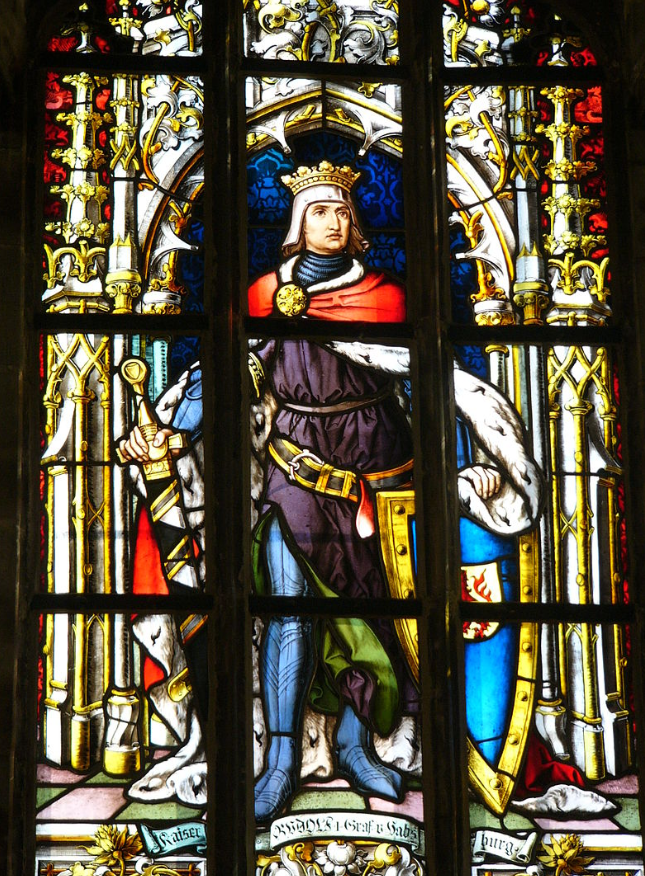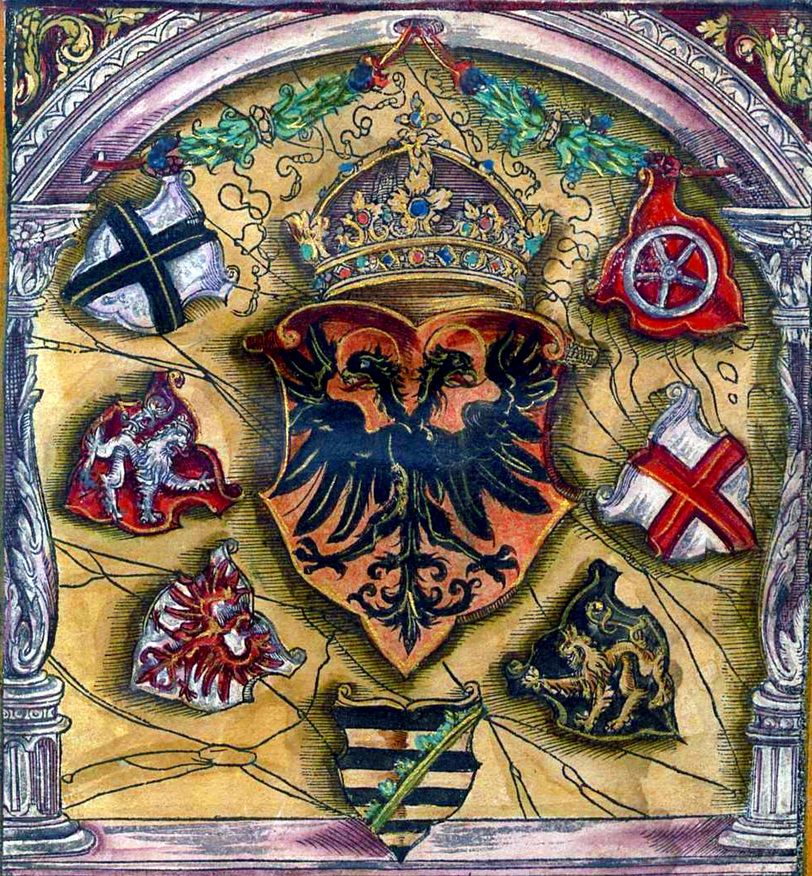Editor’s Note: The following comprises the thirteenth chapter of The Holy Roman Empire, by James Bryce (published 1871). All spelling in the original.
(Continued from Part 12)
CHAPTER XIII
FALL OF THE HOHENSTAUFEN
In the three preceding chapters the Holy Empire has been described in what is not only the most brilliant but the most momentous period of its history; the period of its rivalry with the Popedom for the chief place in Christendom. For it was mainly through their relations with the spiritual power, by their friendship and protection at first, no less than by their subsequent hostility, that the Teutonic Emperors influenced the development of European politics. The reform of the Roman Church which went on during the reigns of Otto I and his successors down to Henry III, and which was chiefly due to the efforts of those monarchs, was the true beginning of the grand period of the Middle Ages, the first of that long series of movements, changes, and creations in the ecclesiastical system of Europe which was, so to speak, the master current of history, secular as well as religious, during the centuries which followed. The first result of Henry III’s purification of the Papacy was seen in Hildebrand’s attempt to subject all jurisdiction to that of his own chair, and in the long struggle of the Investitures, which brought out into clear light the opposing pretensions of the temporal and spiritual powers. Although destined in the end to bear far other fruit, the immediate effect of this struggle was to evoke in all classes an intense religious feeling; and, in opening up new fields of ambition to the hierarchy, to stimulate wonderfully their power of political organization. It was this impulse that gave birth to the Crusades, and that enabled the Popes, stepping forth as the rightful leaders of a religious war, to bend it to serve their own ends: it was thus too that they struck the alliance—strange as such an alliance seems now—with the rebellious cities of Lombardy, and proclaimed themselves the protectors of municipal freedom. But the third and crowning triumph of the Holy See was reserved for the thirteenth century. In the foundation of the two great orders of ecclesiastical knighthood, the all-powerful all-pervading Dominicans and Franciscans, the religious fervour of the Middle Ages culminated: in the overthrow of the only power which could pretend to vie with her in antiquity, in sanctity, in universality, the Papacy saw herself exalted to rule alone over the kings of the earth. Of that overthrow, following with terrible suddenness on the days of strength and glory which we have just been witnessing, this chapter has now to speak.
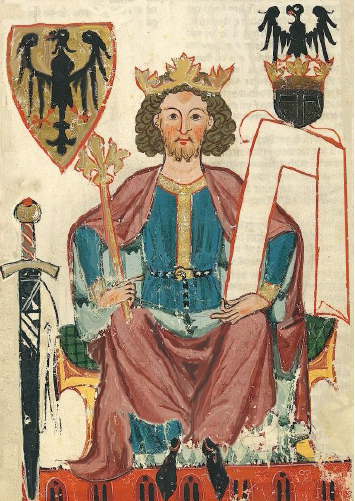
Henry VI, 1190-1197
It happened strangely enough that just while their ruin was preparing, the house of Swabia gained over their ecclesiastical foes what seemed likely to prove an advantage of the first moment. The son and successor of Barbarossa was Henry VI, a man who had inherited all his father’s harshness with none of his father’s generosity. By his marriage with Constance, the heiress of the Norman kings, he had become master of Naples and Sicily. Emboldened by the possession of what had been hitherto the stronghold of his predecessors’ bitterest enemies, and able to threaten the Pope from south as well as north, Henry conceived a scheme which might have wonderfully changed the history of Germany and Italy. He proposed to the Teutonic magnates to lighten their burdens by uniting these newly-acquired countries to the Empire, to turn their feudal lands into allodial, and to make no further demands for money on the clergy, on condition that they should pronounce the crown hereditary in his family. Results of the highest importance would have followed this change, which Henry advocated by setting forth the perils of interregna, and which he doubtless meant to be but part of an entirely new system of polity. Already so strong in Germany, and with an absolute command of their new kingdom, the Hohenstaufen might have dispensed with the renounced feudal services, and built up a firm centralized system, like that which was already beginning to develope itself in France. First, however, the Saxon princes, then some ecclesiastics headed by Conrad of Mentz, opposed the scheme; the pontiff retracted his consent, and Henry had to content himself with getting his infant son Frederick the Second chosen king of the Romans.
Philip, 1198-1208
On Henry’s untimely death the election was set aside, and the contest which followed between Otto of Brunswick and Philip of Hohenstaufen, brother of Henry the Sixth, gave the Popedom, now guided by the genius of Innocent the Third, an opportunity of extending its sway at the expense of its antagonist.
Innocent III and Otto IV
The Pope moved heaven and earth on behalf of Otto, whose family had been the constant rivals of the Hohenstaufen, and who was himself willing to promise all that Innocent required; but Philip’s personal merits and the vast possessions of his house gave him while he lived the ascendancy in Germany. His death by the hand of an assassin, while it seemed to vindicate the Pope’s choice, left the Swabian party without a head, and the Papal nominee was soon recognized over the whole Empire.
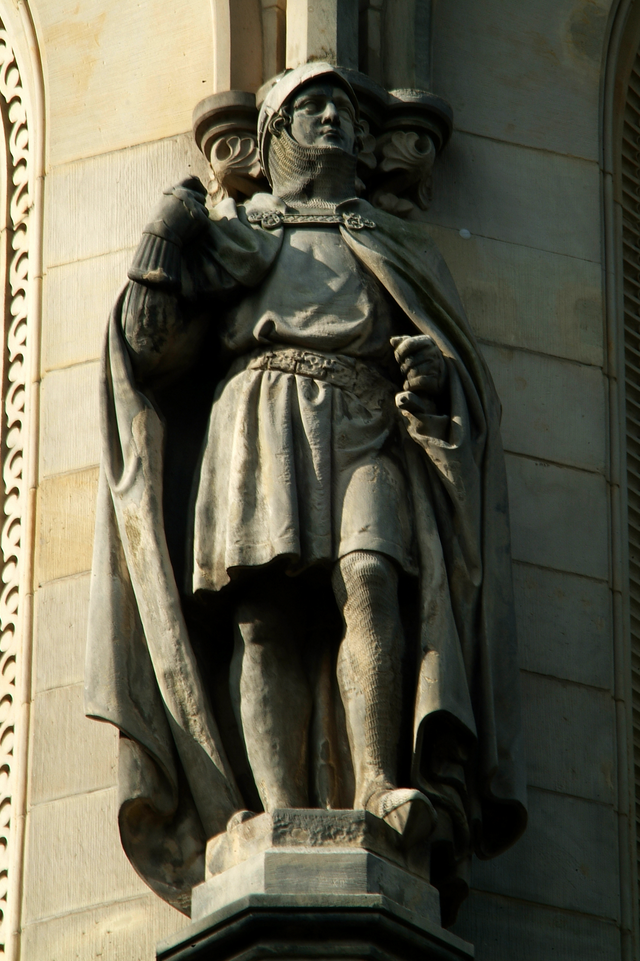
Otto IV, 1208 (1198)-1212
But Otto IV became less submissive as he felt his throne more secure. If he was a Guelf by birth, his acts in Italy, whither he had gone to receive the imperial crown, were those of a Ghibeline, anxious to reclaim the rights he had but just forsworn. The Roman Church at last deposed and excommunicated her ungrateful son, and Innocent rejoiced in a second successful assertion of pontifical supremacy, when Otto was dethroned by the youthful Frederick the Second, whom a tragic irony sent into the field of politics as the champion of the Holy See, whose hatred was to embitter his life and extinguish his house.
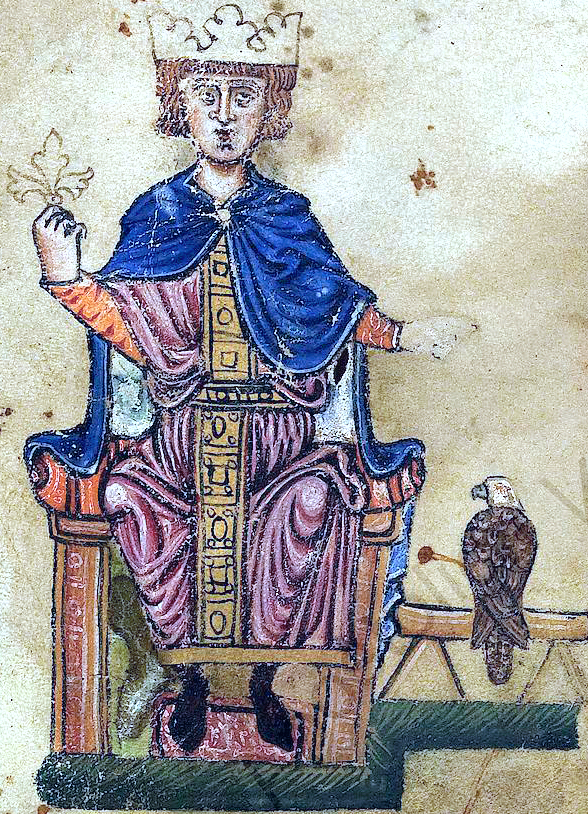
Frederick the Second, 1212-1250
Upon the events of that terrific strife, for which Emperor and Pope girded themselves up for the last time, the narrative of Frederick the Second’s career, with its romantic adventures, its sad picture of marvellous powers lost on an age not ripe for them, blasted as by a curse in the moment of victory, it is not necessary, were it even possible, here to enlarge. That conflict did indeed determine the fortunes of the German kingdom no less than of the republics of Italy, but it was upon Italian ground that it was fought out and it is to Italian history that its details belong. So too of Frederick himself. Out of the long array of the Germanic successors of Charles, he is, with Otto III, the only one who comes before us with a genius and a frame of character that are not those of a Northern or a Teuton. There dwelt in him, it is true, all the energy and knightly valour of his father Henry and his grandfather Barbarossa. But along with these, and changing their direction, were other gifts, inherited perhaps from his Italian mother and fostered by his education among the orange-groves of Palermo—a love of luxury and beauty, an intellect refined, subtle, philosophical. Through the mist of calumny and fable it is but dimly that the truth of the man can be discerned, and the outlines that appear serve to quicken rather than appease the curiosity with which we regard one of the most extraordinary personages in history. A sensualist, yet also a warrior and a politician; a profound lawgiver and an impassioned poet; in his youth fired by crusading fervour, in later life persecuting heretics while himself accused of blasphemy and unbelief; of winning manners and ardently beloved by his followers, but with the stain of more than one cruel deed upon his name, he was the marvel of his own generation, and succeeding ages looked back with awe, not unmingled with pity, upon the inscrutable figure of the last Emperor who had braved all the terrors of the Church and died beneath her ban, the last who had ruled from the sands of the ocean to the shores of the Sicilian sea. But while they pitied they condemned. The undying hatred of the Papacy threw round his memory a lurid light; him and him alone of all the imperial line, Dante, the worshipper of the Empire, must perforce deliver to the flames of hell.
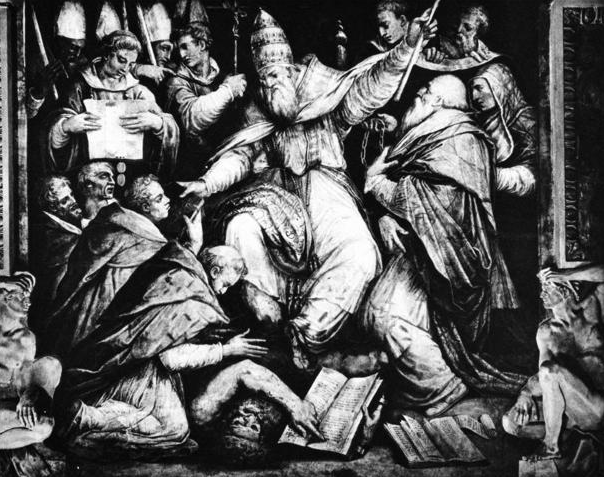
Struggle of Frederick with the Papacy
Placed as the Empire was, it was scarcely possible for its head not to be involved in war with the constantly aggressive Popedom—aggressive in her claims of territorial dominion in Italy as well as of ecclesiastical jurisdiction throughout the world. But it was Frederick’s peculiar misfortune to have given the Popes a hold over him which they well knew how to use. In a moment of youthful enthusiasm he had taken the cross from the hands of an eloquent monk, and his delay to fulfil the vow was branded as impious neglect. Excommunicated by Gregory IX for not going to Palestine, he went, and was excommunicated for going: having concluded an advantageous peace, he sailed for Italy, and was a third time excommunicated for returning. To Pope Gregory he was at last after a fashion reconciled, but with the accession of Innocent IV the flame burst out afresh. Upon the special pretexts which kindled the strife it is not worth while to descant: the real causes were always the same, and could only be removed by the submission of one or other combatant. Chief among them was Frederick’s possession of Sicily. Now were seen the fruits which Barbarossa had stored up for his house when he gained for Henry his son the hand of the Norman heiress. Naples and Sicily had been for some two hundred years recognized as a fief of the Holy See, and the Pope, who felt himself in danger while encircled by the powers of his rival, was determined to use his advantage to the full and make it the means of extinguishing imperial authority throughout Italy. But although the struggle was far more of a territorial and political one than that of the previous century had been, it reopened every former source of strife, and passed into a contest between the civil and the spiritual potentate. The old war-cries of Henry and Hildebrand, of Barbarossa and Alexander, roused again the unquenchable hatred of Italian factions: the pontiff asserted the transference of the Empire as a fief, and declared that the power of Peter, symbolized by the two keys, was temporal as well as spiritual: the Emperor appealed to law, to the indelible rights of Cæsar; and denounced his foe as the antichrist of the New Testament, since it was God’s second vicar whom he was resisting. The one scoffed at anathema, upbraided the avarice of the Church, and treated her soldiery, the friars, with a severity not seldom ferocious. The other solemnly deposed a rebellious and heretical prince, offered the imperial crown to Robert of France, to the heir of Denmark, to Haco the Norse king; succeeded at last in raising up rivals in Henry of Thuringia and William of Holland. Yet throughout it is less the Teutonic Emperor who is attacked than the Sicilian king, the unbeliever and friend of Mohammedans, the hereditary enemy of the Church, the assailant of Lombard independence, whose success must leave the Papacy defenceless. And as it was from the Sicilian kingdom that the strife chiefly arose, so was the possession of the Sicilian kingdom a source rather of weakness than of strength, for it distracted Frederick’s forces and put him in the false position of a liegeman resisting his lawful suzerain. Truly, as the Greek proverb says, the gifts of foes are no gifts, and bring no profit with them. The Norman kings were more terrible in their death than in their life: they had sometimes baffled the Teutonic Emperor; their heritage destroyed him.
Conrad IV, 1250-1254
With Frederick fell the Empire. From the ruin that overwhelmed the greatest of its houses it emerged, living indeed, and destined to a long life, but so shattered, crippled, and degraded, that it could never more be to Europe and to Germany what it once had been. In the last act of the tragedy were joined the enemy who had now blighted its strength and the rival who was destined to insult its weakness and at last blot out its name. The murder of Frederick’s grandson Conradin—a hero whose youth and whose chivalry might have moved the pity of any other foe—was approved, if not suggested, by Pope Clement; it was done by the minions of Charles of France.
Italy lost to the Empire
The Lombard league had successfully resisted Frederick’s armies and the more dangerous Ghibeline nobles: their strong walls and swarming population made defeats in the open field hardly felt; and now that South Italy too had passed away from a German line—first to an Angevin, afterwards to an Aragonese dynasty—it was plain that the peninsula was irretrievably lost to the Emperors. Why, however, should they not still be strong beyond the Alps? was their position worse than that of England when Normandy and Aquitaine no longer obeyed a Plantagenet? The force that had enabled them to rule so widely would be all the greater in a narrower sphere.
Decline of imperial power in Germany
So indeed it might once have been, but now it was too late. The German kingdom broke down beneath the weight of the Roman Empire. To be universal sovereign Germany had sacrificed her own political existence. The necessity which their projects in Italy and disputes with the Pope laid the Emperors under of purchasing by concessions the support of their own princes, the ease with which in their absence the magnates could usurp, the difficulty which the monarch returning found in resuming the privileges of his crown, the temptation to revolt and set up pretenders to the throne which the Holy See held out, these were the causes whose steady action laid the foundation of that territorial independence which rose into a stable fabric at the era of the Great Interregnum.
The Great Interregnum
Frederick II had by two Pragmatic Sanctions, A.D. 1220 and 1232, granted, or rather confirmed, rights already customary, such as to give the bishops and nobles legal sovereignty in their own towns and territories, except when the Emperor should be present; and thus his direct jurisdiction became restricted to his narrowed domain, and to the cities immediately dependent on the crown. With so much less to do, an Emperor became altogether a less necessary personage; and hence the seven magnates of the realm, now by law or custom sole electors, were in no haste to fill up the place of Conrad IV, whom the supporters of his father Frederick had acknowledged. William of Holland was in the field, but rejected by the Swabian party: on his death a new election was called for, and at last set on foot.
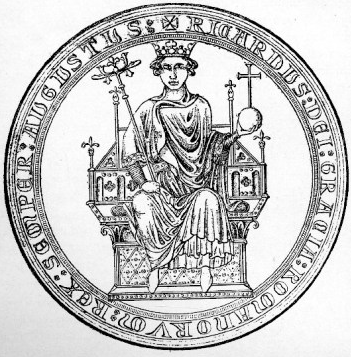
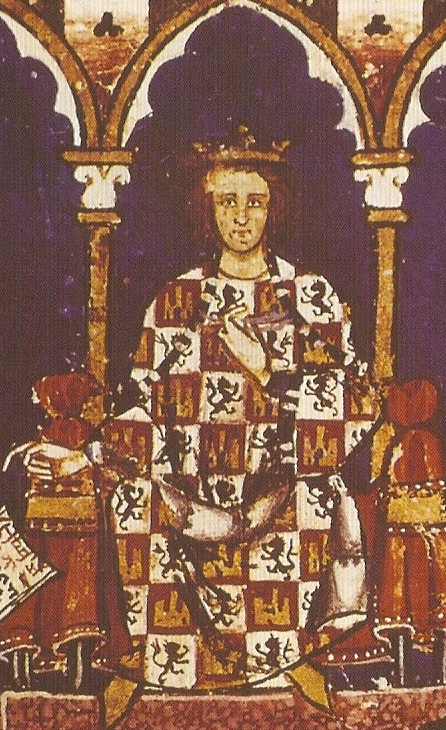
Double election, of Richard of England and Alfonso of Castile
The archbishop of Cologne advised his brethren to choose some one rich enough to support the dignity, not strong enough to be feared by the electors: both requisites met in the Plantagenet Richard, earl of Cornwall, brother of the English Henry III. He received three, eventually four votes, came to Germany, and was crowned at Aachen. But three of the electors, finding that his bribe to them was lower than to the others, seceded in disgust, and chose Alfonso X of Castile, who, shrewder than his competitor, continued to watch the stars at Toledo, enjoying the splendours of his title while troubling himself about it no further than to issue now and then a proclamation.
State of Germany during the Interregnum
Meantime the condition of Germany was frightful. The new Didius Julianus, the chosen of princes baser than the prætorians whom they copied, had neither the character nor the outward power and resources to make himself respected. Every floodgate of anarchy was opened: prelates and barons extended their domains by war: robber-knights infested the highways and the rivers: the misery of the weak, the tyranny and violence of the strong, were such as had not been seen for centuries. Things were even worse than under the Saxon and Franconian Emperors; for the petty nobles who had then been in some measure controlled by their dukes were now, after the extinction of the great houses, left without any feudal superior. Only in the cities was shelter or peace to be found. Those of the Rhine had already leagued themselves for mutual defence, and maintained a struggle in the interests of commerce and order against universal brigandage.
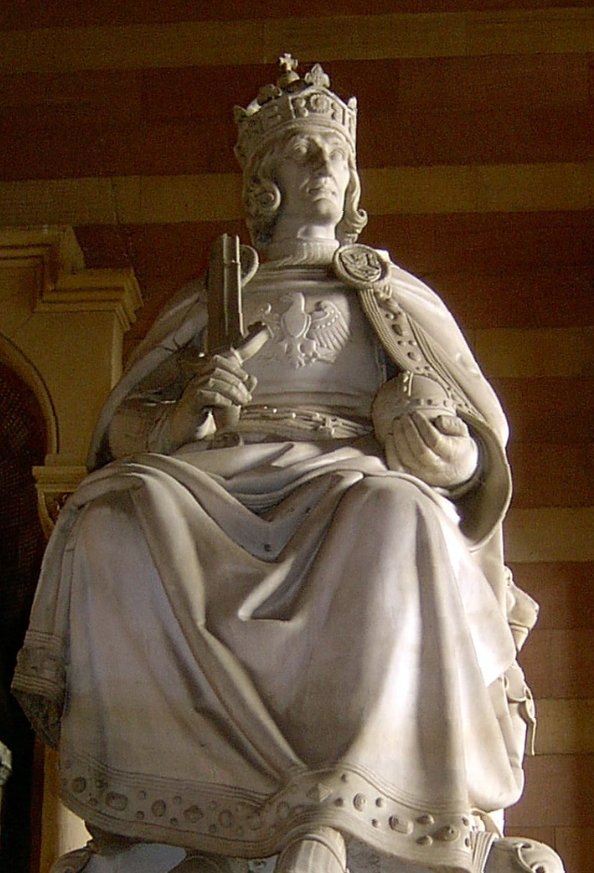
Rudolf of Hapsburg, 1272-1292
At last, when Richard had been some time dead, it was felt that such things could not go on for ever: with no public law, and no courts of justice, an Emperor, the embodiment of legal government, was the only resource. The Pope himself, having now sufficiently improved the weakness of his enemy, found the disorganization of Germany beginning to tell upon his revenues, and threatened that if the electors did not appoint an Emperor, he would. Thus urged, they chose, in A.D. 1272, Rudolf, count of Hapsburg, founder of the house of Austria.
Change in the position of the Empire
From this point there begins a new era. We have seen the Roman Empire revived in A.D. 800, by a prince whose vast dominions gave ground to his claim of universal monarchy; again erected, in A.D. 962, on the narrower but firmer basis of the German kingdom. We have seen Otto the Great and his successors during the three following centuries, a line of monarchs of unrivalled vigour and abilities, strain every nerve to make good the pretensions of their office against the rebels in Italy and the ecclesiastical power. Those efforts had now failed signally and hopelessly. Each successive Emperor had entered the strife with resources scantier than his predecessors, each had been more decisively vanquished by the Pope, the cities, and the princes. The Roman Empire might, and, so far as its practical utility was concerned, ought now to have been suffered to expire; nor could it have ended more gloriously than with the last of the Hohenstaufen. That it did not so expire, but lived on six hundred years more, till it became a piece of antiquarianism hardly more venerable than ridiculous—till, as Voltaire said, all that could be said about it was that it was neither holy, nor Roman, nor an empire—was owing partly indeed to the belief, still unshaken, that it was a necessary part of the world’s order, yet chiefly to its connection, which was by this time indissoluble, with the German kingdom. The Germans had confounded the two characters of their sovereign so long, and had grown so fond of the style and pretensions of a dignity whose possession appeared to exalt them above the other peoples of Europe, that it was now too late for them to separate the local from the universal monarch. If a German king was to be maintained at all, he must be Roman Emperor; and a German king there must still be. Deeply, nay, mortally wounded as the event proved his power to have been by the disasters of the Empire to which it had been linked, the time was by no means come for its extinction. In the unsettled state of society, and the conflict of innumerable petty potentates, no force save feudalism was able to hold society together; and its efficacy for that purpose depended, as the anarchy of the recent interregnum shewed, upon the presence of the recognized feudal head.
Decline of the regal power in Germany as compared with France and England
That head, however, was no longer what he had been. The relative position of Germany and France was now exactly the reverse of that which they had occupied two centuries earlier. Rudolf was as conspicuously a weaker sovereign than Philip III of France, as the Franconian Emperor Henry III had been stronger than the Capetian Philip I. In every other state of Europe the tendency of events had been to centralize the administration and increase the power of the monarch, even in England not to diminish it: in Germany alone had political union become weaker, and the independence of the princes more confirmed. The causes of this change are not far to seek. They all resolve themselves into this one, that the German king attempted too much at once. The rulers of France, where manners were less rude than in the other Transalpine lands, and where the Third Estate rose into power more quickly, had reduced one by one the great feudataries by whom the first Capetians had been scarcely recognized. The English kings had annexed Wales, Cumbria, and part of Ireland, had obtained a prerogative great if not uncontrolled, and exercised no doubtful sway through every corner of their country. Both had won their successes by the concentration on that single object of their whole personal activity, and by the skilful use of every device whereby their feudal rights, personal, judicial, and legislative, could be applied to fetter the vassal. Meantime the German monarch, whose utmost efforts it would have needed to tame his fierce barons and maintain order through wide territories occupied by races unlike in dialect and customs, had been struggling with the Lombard cities and the Normans of South Italy, and had been for full two centuries the object of the unrelenting enmity of the Roman pontiff. And in this latter contest, by which more than by any other the fate of the Empire was decided, he fought under disadvantages far greater than his brethren in England and France. William the Conqueror had defied Hildebrand, William Rufus had resisted Anselm; but the Emperors Henry the Fourth and Barbarossa had to cope with prelates who were Hildebrand and Anselm in one; the spiritual heads of Christendom as well as the primates of their special realm, the Empire. And thus, while the ecclesiastics of Germany were a body more formidable from their possessions than those of any other European country, and enjoying far larger privileges, the Emperor could not, or could with far less effect, win them over by invoking against the Pope that national feeling which made the cry of Gallican liberties so welcome even to the clergy of France.
Relations of the Papacy and the Empire
After repeated defeats, each more crushing than the last, the imperial power, so far from being able to look down on the papal, could not even maintain itself on an equal footing. Against no pontiff since Gregory VII had the monarch’s right to name or confirm a pope, undisputed in the days of the Ottos and of Henry III, been made good. It was the turn of the Emperor to repel a similar claim of the Holy See to the function of reviewing his own election, examining into his merits, and rejecting him if unsound, that is to say, impatient of priestly tyranny. A letter of Innocent III, who was the first to make this demand in terms, was inserted by Gregory IX in his digest of the Canon Law, the inexhaustible armoury of the churchman, and continued to be quoted thence by every canonist till the end of the sixteenth century. It was not difficult to find grounds on which to base such a doctrine. Gregory VII deduced it with characteristic boldness from the power of the keys, and the superiority over all other dignities which must needs appertain to the Pope as arbiter of eternal weal or woe. Others took their stand on the analogy of clerical ordination, and urged that since the Pope in consecrating the Emperor gave him a title to the obedience of all Christian men, he must have himself the right of approving or rejecting the candidate according to his merits. Others again, appealing to the Old Testament, shewed how Samuel discarded Saul and anointed David in his room, and argued that the Pope now must have powers at least equal to those of the Hebrew prophets. But the ascendancy of the doctrine dates from the time of Pope Innocent III, whose ingenuity discovered for it an historical basis. It was by the favour of the Pope, he declared, that the Empire was taken away from the Greeks and given to the Germans in the person of Charles, and the authority which Leo then exercised as God’s representative must abide thenceforth and for ever in his successors, who can therefore at any time recall the gift, and bestow it on a person or a nation more worthy than its present holders. This is the famous theory of the Translation of the Empire, which plays so large a part in controversy down till the seventeenth century, a theory with plausibility enough to make it generally successful, yet one which to an impartial eye appears far removed from the truth of the facts. Leo III did not suppose, any more than did Charles himself, that it was by his sole pontifical authority that the crown was given to the Frank; nor do we find such a notion put forward by any of his successors down to the twelfth century. Gregory VII in particular, in a remarkable letter dilating on his prerogative, appeals to the substitution by papal interference of Pipin for the last Merovingian king, and even goes back to cite the case of Theodosius humbling himself before St. Ambrose, but says never a word about this ‘translatio,’ excellently as it would have served his purpose.
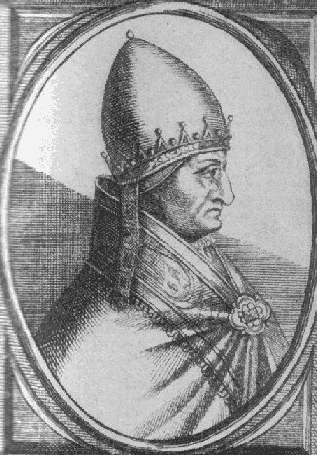
Sound or unsound, however, these arguments did their work, for they were urged skilfully and boldly, and none denied that it was by the Pope alone that the crown could be lawfully imposed. In some instances the rights claimed were actually made good. Thus Innocent III withstood Philip and overthrew Otto IV; thus another haughty priest commanded the electors to choose the Landgrave of Thuringia (A.D. 1246), and was by some of them obeyed; thus Gregory X compelled the recognition of Rudolf. The further pretensions of the Popes to the vicariate of the Empire during interregna the Germans never admitted. Still their place was now generally felt to be higher than that of the monarch, and their control over the three spiritual electors and the whole body of the clergy was far more effective than his. A spark of national feeling was at length kindled by the exactions and shameless subservience to France of the papal court at Avignon; and the infant democracy of industry and intelligence represented by the cities and 220 by the English Franciscan Occam, supported Lewis IV in his conflict with John XXII, till even the princes who had risen by the help of the Pope were obliged to oppose him. The same sentiment dictated the reforms of Constance, but the imperial power which might have floated onwards and higher on the turning tide of popular opinion lacked men equal to the occasion: the Hapsburg Frederick the Third, timid and superstitious, abased himself before the Romish court, and his house has generally adhered to the alliance then struck.

